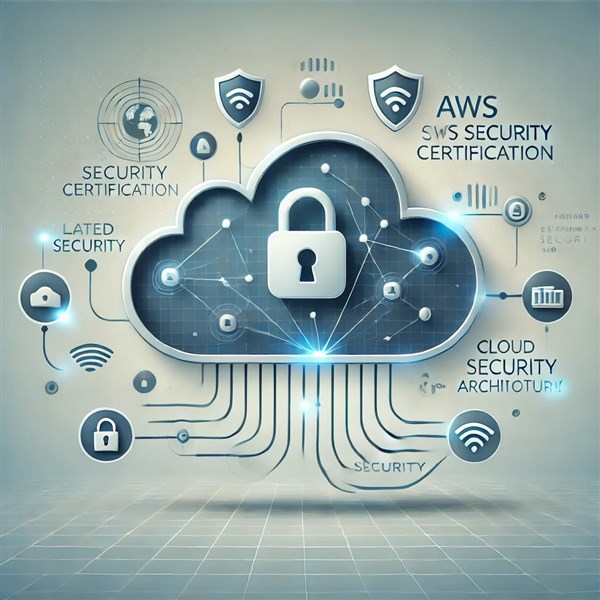
In an era where cloud computing is increasingly becoming the backbone of digital transformation, security is paramount. As organizations across industries migrate their infrastructure to the cloud, they face a range of emerging security threats. Cloud security has evolved from a complementary feature to a business-critical function, requiring skilled professionals to protect data and applications. One of the most valuable tools in this domain is the AWS Security Certification, which equips professionals with the skills needed to secure AWS cloud environments and prepares them for future challenges in cloud security.
In the digital age, security has become a top priority for businesses worldwide. As more companies migrate their operations to the cloud, the demand for professionals with a solid understanding of cloud security has skyrocketed. This increased demand has led to the rise of the AWS Cloud Security Course.
The Growing Importance of Cloud Security
With businesses shifting to cloud platforms like Amazon Web Services (AWS), the role of cloud security has significantly expanded. The demand for secure cloud operations has increased exponentially, driven by the following factors:
- Rising Cybersecurity Threats: As businesses increasingly rely on cloud computing, cybercriminals have turned their attention to exploiting vulnerabilities within cloud infrastructure. According to recent studies, over 80% of organizations experienced at least one cloud-related security breach.
- Complex Multi-Cloud Environments: Many organizations now use a combination of cloud services from AWS, Google Cloud, Microsoft Azure, and others. Securing a multi-cloud environment poses new challenges that require professionals to possess advanced security skills and cross-platform knowledge.
- Increased Regulation and Compliance: With the rise in privacy regulations such as GDPR and CCPA, companies need to ensure that their cloud environments comply with legal standards. Failure to do so can result in hefty fines and reputational damage.
- Cloud-Native Technologies: New technologies such as serverless computing, microservices, and containers have changed the way cloud infrastructures operate. These advancements require updated security strategies that are often complex and specialized.
Why AWS Security Certification Is Crucial
The AWS Certified Security – Specialty is a certification designed for professionals who wish to demonstrate their expertise in securing AWS cloud environments. This certification equips IT professionals with an in-depth understanding of cloud security fundamentals, AWS security best practices, and knowledge to handle the latest cloud security challenges.
Here are some key reasons why obtaining an AWS Security Certification is essential for cloud security professionals:
- Comprehensive Knowledge of AWS Security Features: AWS offers a vast range of security services, from Identity and Access Management (IAM) to encryption and monitoring. The certification covers every aspect of securing AWS infrastructures, ensuring that professionals can protect sensitive data and applications.
- Stay Ahead of Emerging Cloud Threats: The cloud landscape is constantly evolving, and so are the threats associated with it. AWS certification provides ongoing education and updates to keep professionals informed about the latest security trends and vulnerabilities.
- Increased Job Market Demand: The demand for certified AWS professionals has never been higher. Companies prioritize AWS-certified individuals when hiring for security roles, making it a critical qualification for advancing in the field of cloud security.
- Hands-On Experience with Real-World Applications: The AWS Security Certification emphasizes hands-on practice, ensuring that candidates not only learn security theory but also how to apply it in real-world cloud environments. This practical experience prepares candidates to tackle security challenges head-on.
Emerging Trends in Cloud Security
With cloud adoption on the rise, several new trends in cloud security are emerging. AWS Security Certification prepares professionals to manage these trends, making them future-ready.
1. Zero Trust Architecture (ZTA)
Zero Trust Architecture is a security model based on the principle that no user, device, or network—whether inside or outside the organization—should be trusted automatically. In a Zero Trust model, authentication and authorization are verified continuously, regardless of where users are located. This shift is gaining popularity in cloud environments as more organizations adopt hybrid or multi-cloud strategies.
The AWS Security Certification prepares professionals for ZTA by covering security practices like IAM, encryption, and monitoring, which are integral to implementing Zero Trust within AWS environments.
2. AI and Machine Learning for Security Automation
AI and machine learning (ML) are reshaping the future of cloud security by automating threat detection and incident response. AWS offers several security services that integrate AI and ML, such as Amazon GuardDuty and AWS Security Hub, which help detect anomalies and automate security tasks.
With AWS Security Certification, professionals learn how to leverage these AWS services and integrate AI-driven automation into security workflows, reducing the manual burden of monitoring and responding to threats.
3. Cloud-Native Security for Containers and Serverless Architectures
The rise of containers and serverless architectures in cloud computing has introduced new security challenges. Traditional security measures may not apply to these environments, requiring new approaches to securing workloads. AWS offers specialized security features for managing containerized applications and serverless functions, such as Amazon ECS, AWS Lambda, and AWS Fargate.
AWS Security Certification covers these cloud-native security technologies, ensuring that professionals can protect applications in these modern environments by securing APIs, managing secrets, and monitoring traffic flows.
4. Edge Computing Security
Edge computing, where data is processed closer to where it is generated, is another emerging trend in cloud security. While edge computing enhances speed and reduces latency, it also introduces new security vulnerabilities at the edge nodes. AWS services like AWS IoT Greengrass extend cloud capabilities to edge devices, but securing these environments requires a new set of skills.
AWS Security Certification includes topics on securing IoT and edge devices, enabling professionals to safeguard data, applications, and infrastructure in edge computing scenarios.
5. Compliance and Governance in the Cloud
Cloud compliance is becoming a top priority as regulations like GDPR and HIPAA impose stringent requirements on data protection and privacy. Organizations need to ensure that their cloud environments are compliant with various regulatory standards. AWS offers services such as AWS Config and AWS Audit Manager to help organizations manage compliance in real time.
The AWS Security Certification prepares professionals to use these services and other governance tools, ensuring that they can help their organizations meet compliance requirements in AWS environments.
How AWS Security Certification Prepares You for the Future
The AWS Security Certification not only validates your ability to secure cloud environments but also prepares you for the future of cloud security by equipping you with the skills to manage the following key areas:
- Risk Identification and Mitigation: Certification training covers how to identify security risks in AWS and apply mitigation techniques to reduce potential breaches.
- Security Automation: AWS professionals learn how to use automation tools to secure cloud environments at scale, minimizing human errors and increasing efficiency.
- Incident Response: The certification ensures that professionals are well-prepared to handle security incidents and respond to breaches in a cloud context.
- Evolving Cloud Technologies: As AWS continues to innovate with new cloud technologies, the certification keeps professionals updated on the latest developments and trends, ensuring that they stay relevant in the job market.
Conclusion
As the world moves towards an increasingly cloud-based future, the need for robust cloud security practices continues to grow. The AWS Security Certification is essential for cloud security professionals who want to stay ahead of the curve, ensuring that they have the skills and knowledge to tackle emerging security challenges. By staying current with trends like Zero Trust, AI-driven security automation, and cloud-native technologies, AWS-certified professionals are well-prepared to protect cloud infrastructures in an ever-evolving digital landscape.
If you're looking to advance your career in cloud security, obtaining an AWS Security Certification is one of the most impactful steps you can take. Not only does it provide you with cutting-edge skills, but it also positions you as a key player in the future of cloud security.
As cloud adoption continues to grow, so does the demand for professionals with cloud security skills. The AWS Cloud Security Certification is an excellent way to validate your skills and stand out in the job market. Koenig Solutions, a leading IT training company, offers extensive AWS Security training programs designed to help you ace the certification exam and stay ahead of emerging trends in cloud security.







COMMENT